Rotating Disk Effect on Surrounding Airflow, Moving Wall
$60.00 $30.00 Student Discount
- The problem numerically simulates Rotating Disk in a room using ANSYS Fluent software.
- We design the 3-D model by the Design Modeler software.
- We Mesh the model by ANSYS Meshing software, and the element number equals 716870.
- We use the Moving Wall for the disk to define the rotational movement.
Click on Add To Cart and obtain the Geometry file, Mesh file, and a Comprehensive ANSYS Fluent Training Video.
To Order Your Project or benefit from a CFD consultation, contact our experts via email (info@mr-cfd.com), online support tab, or WhatsApp at +44 7443 197273.
There are some Free Products to check our service quality.
If you want the training video in another language instead of English, ask it via info@mr-cfd.com after you buy the product.
Description
Rotating Disk Effect on Surrounding Airflow CFD Simulation using Moving Wall, ANSYS Fluent Training
The present problem simulates a Rotating Disk Effect on Surrounding Airflow using ANSYS Fluent software. We perform this CFD project and investigate it by CFD analysis.
The present model is designed in three dimensions using Design Modeler software. The model’s geometry consists of a room measuring 0.5 m * 0.5 m * 1 m, in the middle of which there is a rotating disk 0.02 m thick and 0.1 m in diameter.
The meshing of this present model has been generated by Ansys Meshing software. The total cell number is 716870.
Methodology
The present problem simulates a rotating disk in a room using ANSYS Fluent software.
This work investigates the airflow behavior under the influence of the rotational motion of a rotating disk. In this simulation, airflow is in a computational domain (room), and a rotating disk with a certain rotational speed is placed in the middle of this room.
To define the rotational motion of a disk, the boundary condition of a moving wall with a speed of 5 rad/s must be used. Moreover, the laminar model is enabled to solve the fluid equations.
Conclusion
At the end of the solution process, we obtain two-dimensional and three-dimensional contours related to pressure, velocity, and velocity vectors. Since the disk output is a moving wall, the rotating disk has its maximum velocity at this output boundary.
By moving away from this boundary, the velocity decreases. As the velocity vectors show, the current under this rotation separates from the disk’s surface. Due to the low rotation speed of the disk, this separation is also slow.
As the velocity volume contour shows, the room air velocity has slightly increased in this area near the rotating disk. The pressure has also decreased. These results can be seen symmetrically on the back and the front of the disc.
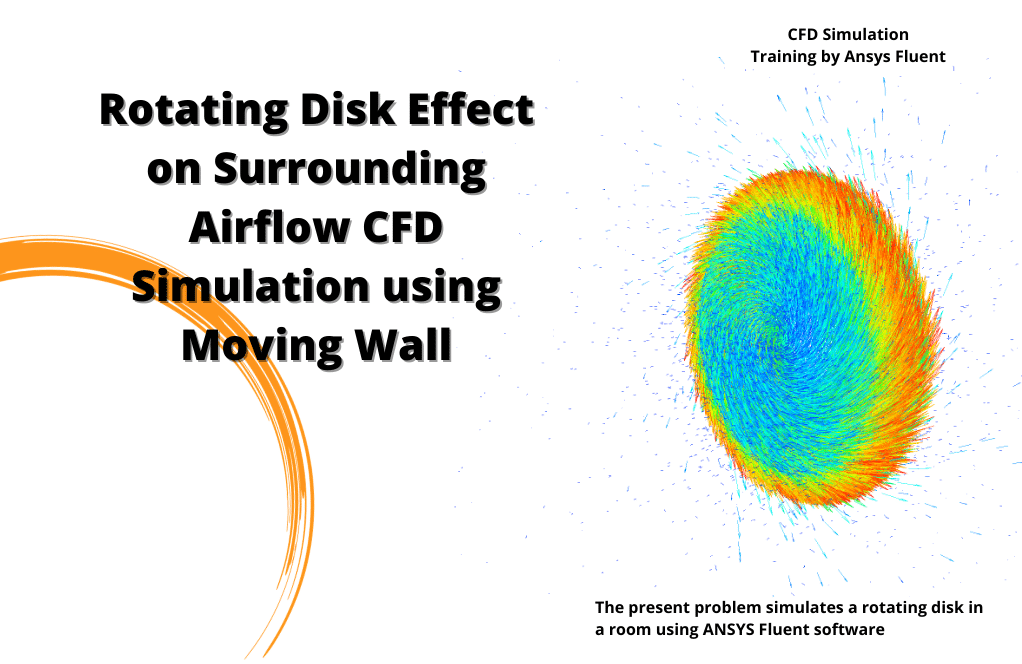
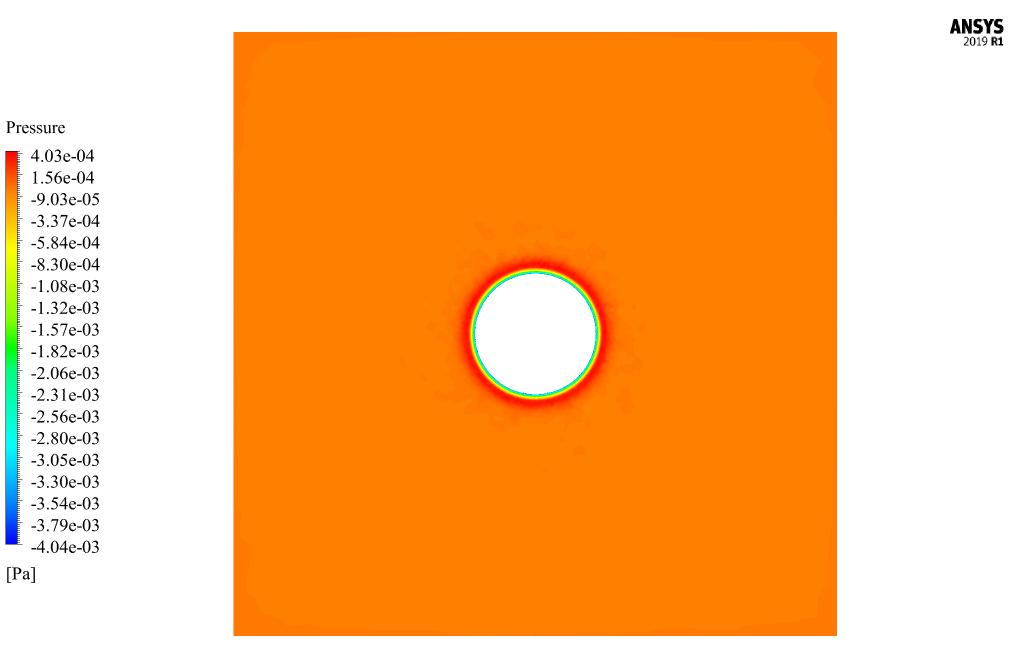
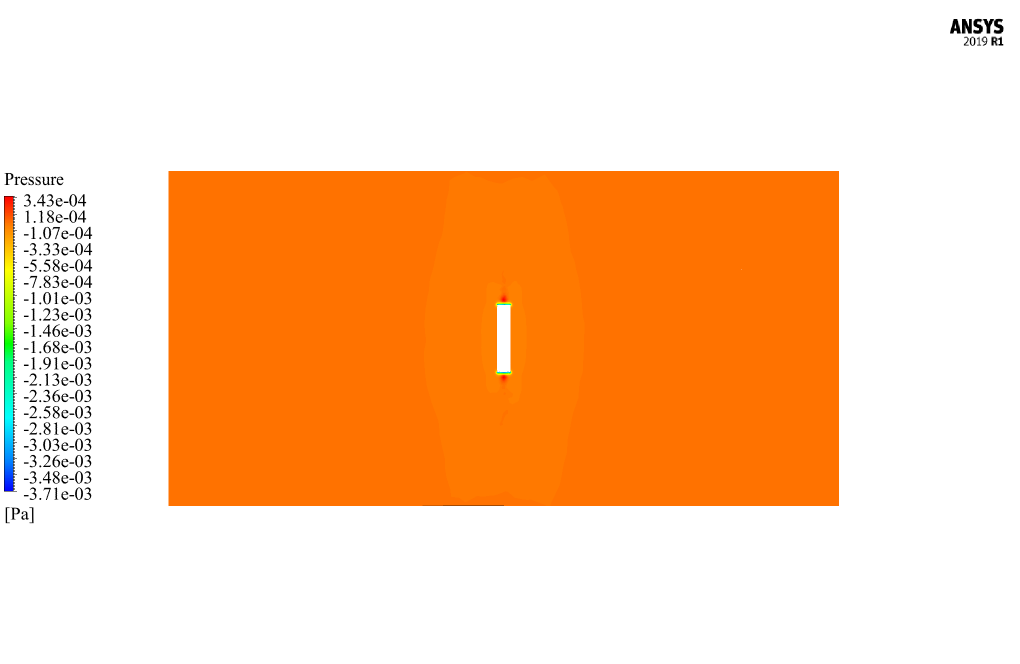
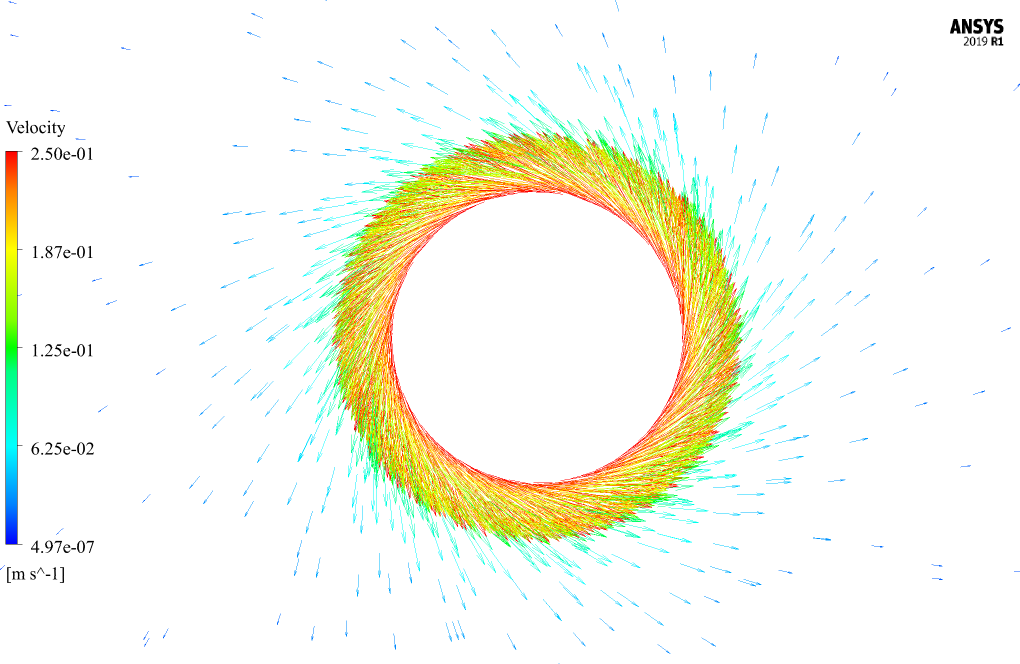
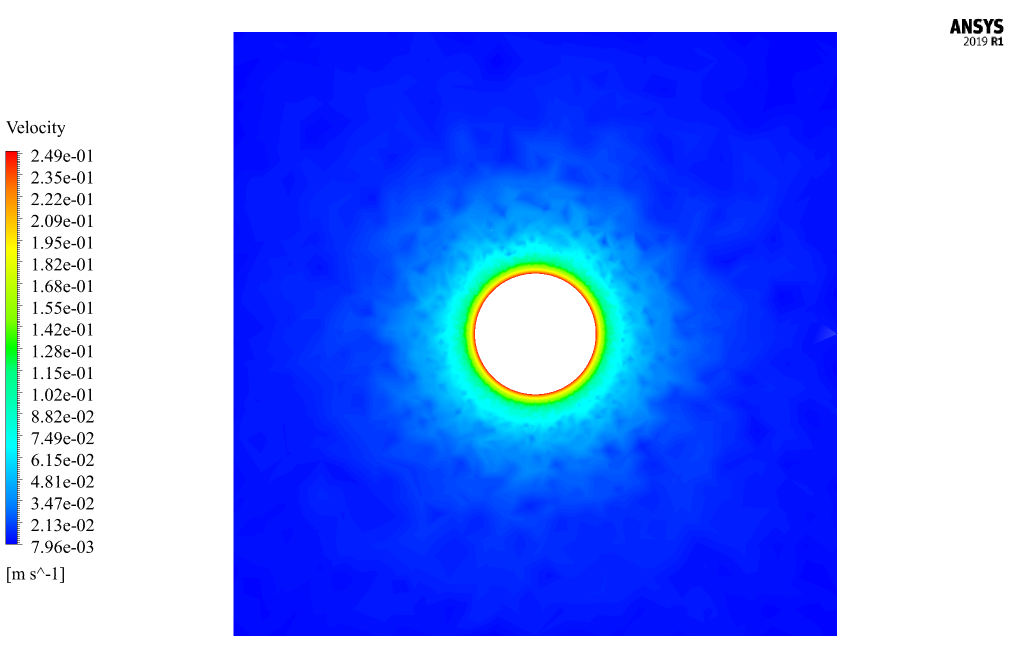
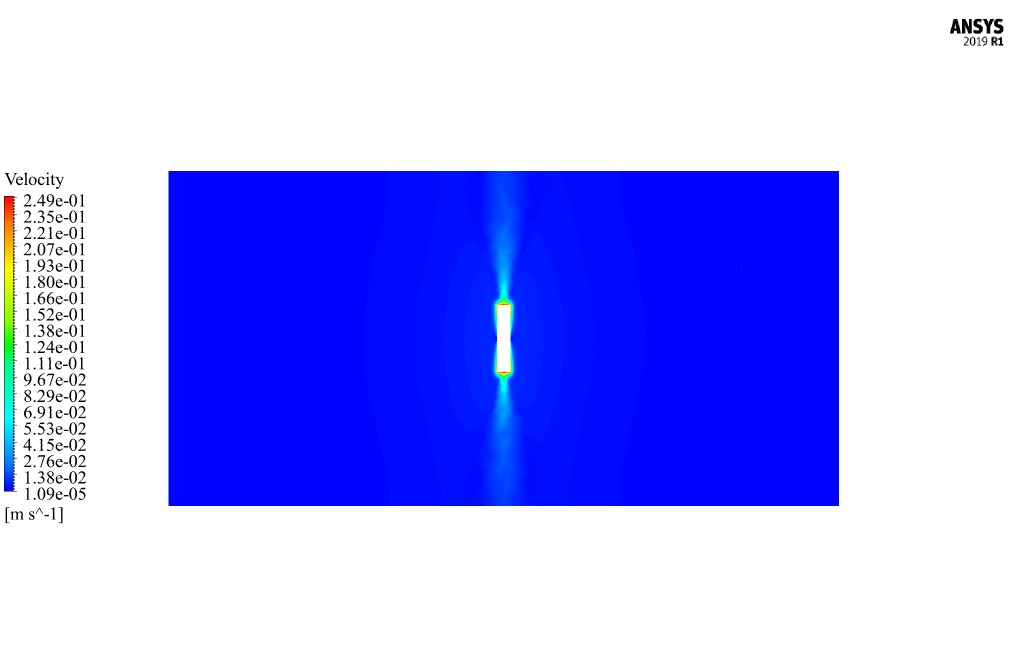
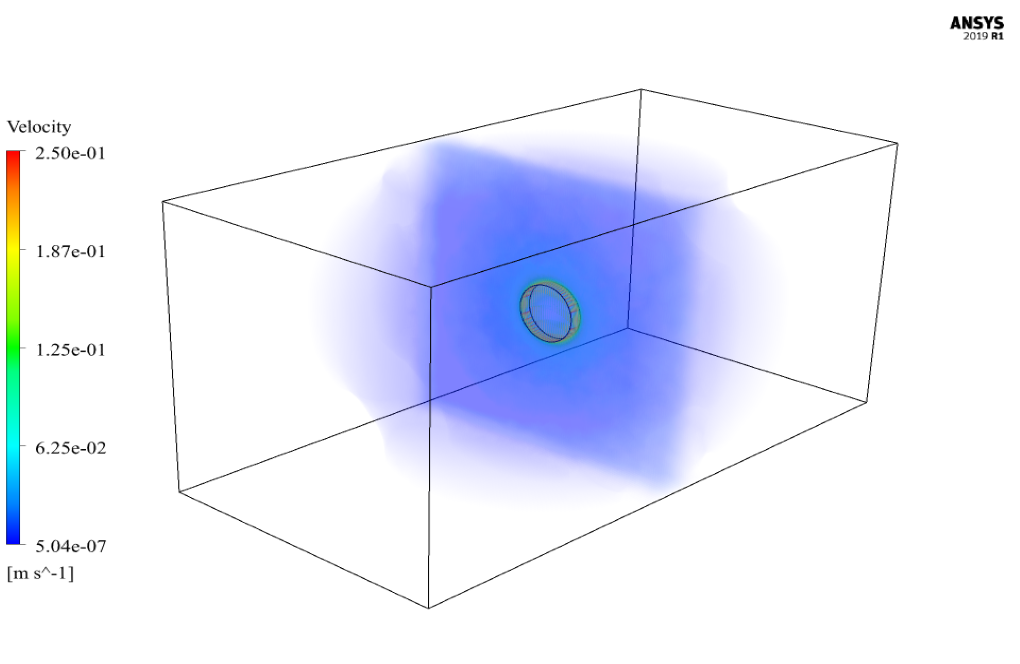
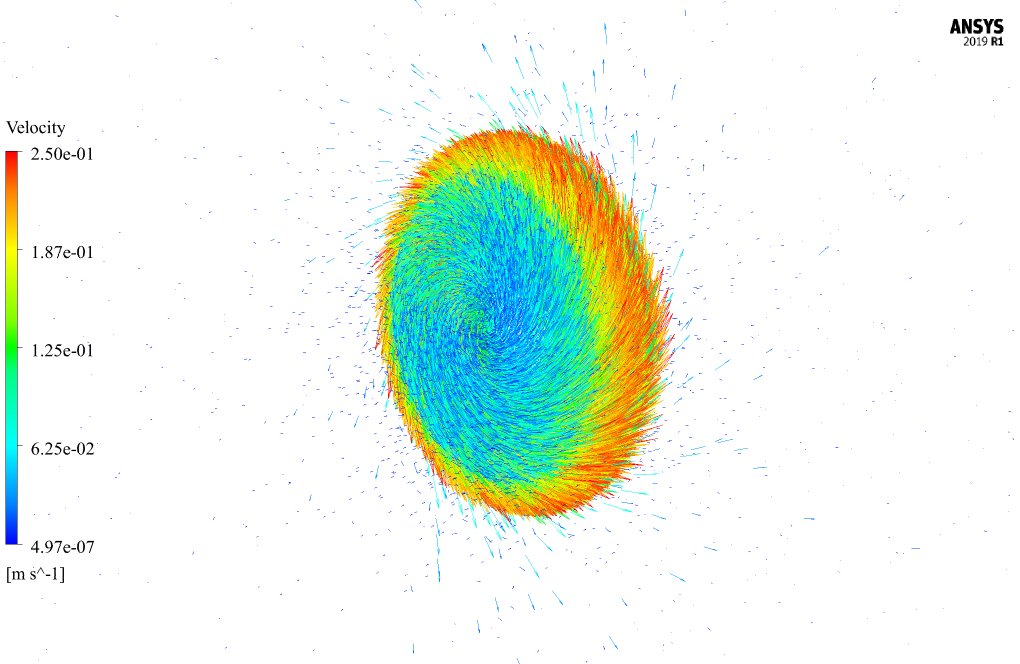


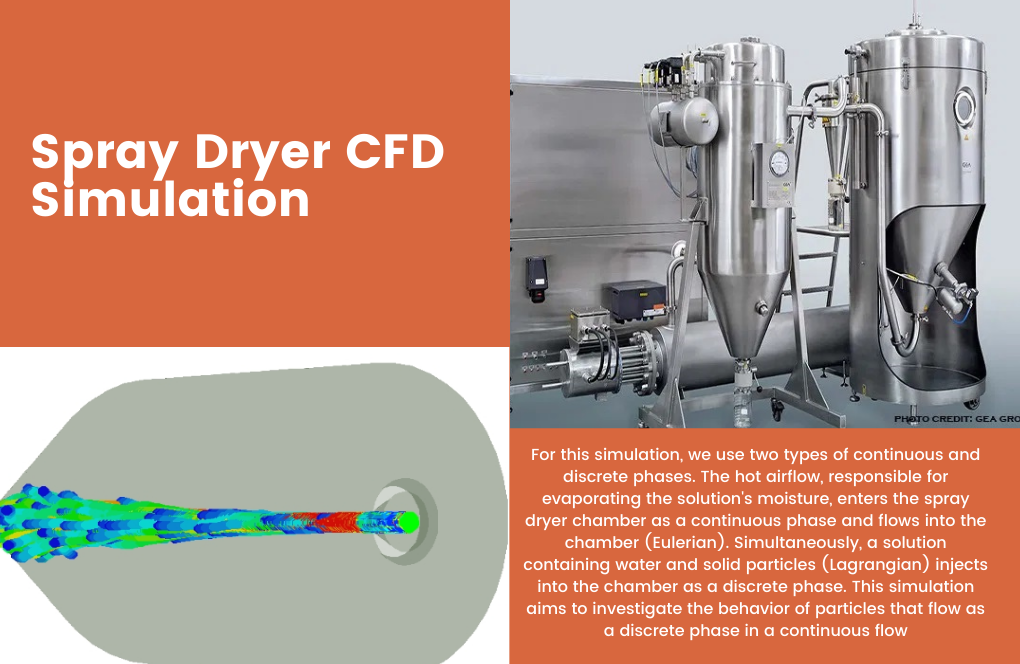
Clair Baumbach –
I was thoroughly impressed with the way the rotating disk influences the surrounding airflow and how it is depicted in the simulation results. The visual contours for velocity and pressure provide a clear view of the fluid behavior, which has greatly benefited my understanding of the topic.
MR CFD Support –
Thank you for your positive feedback! It’s great to hear that our CFD simulation has contributed to your understanding of airflow around rotating objects. If you ever have further questions or need more insights, feel free to reach out.
Dr. Cole Pacocha Sr. –
I was thoroughly impressed with the CFD simulation of the Rotating Disk Effect on Surrounding Airflow using ANSYS Fluent. The detailed analysis and the ability to visualize pressure, velocity, and rotational effects in both two-dimensional and three-dimensional contours were remarkable. The training material provided a clear understanding of how to set up and interpret the simulations. Great job on crafting such a comprehensive and educational offering!
MR CFD Support –
Thank you so much for your positive feedback! We are thrilled to hear that you found the Rotating Disk Effect on Surrounding Airflow simulation comprehensive and educational. It’s fantastic to know that our training material was helpful for understanding the setup and interpretation of CFD simulations in ANSYS Fluent. We appreciate your kind words and look forward to providing you with more high-quality learning products in the future.
Misty McKenzie PhD –
I’m impressed with the detail in the simulation around the rotating disk. What were the challenges faced while modeling the airflow around the moving disk and ensuring accurate results?
MR CFD Support –
Thank you for your compliment! One major challenge in modeling airflow around moving objects lies in accurately capturing the boundary layer behavior, especially at the interface where the disk impacts the air. Additionally, setting up the moving wall boundary condition to reflect the rotational speed accurately and handling the mesh in a manner that adapts seamlessly to the moving wall are also critical for realistic simulation outcomes. We overcome these by fine-tuning the mesh near the rotating disk and meticulously setting the flow properties. Our well-established methodologies ensure our simulations can predict flow phenomena with high fidelity.
Houston Hartmann DDS –
I’ve thoroughly enjoyed using the ‘Rotating Disk Effect on Surrounding Airflow’ training package by ANSYS Fluent! The clarity of the methodology used brightened my understanding of airflow patterns in a rotating system. Excellent visuals that depicted pressure and velocity changes!
MR CFD Support –
We’re delighted to hear that our training materials met your expectations and helped clarify complex airflow concepts. Thank you for sharing your positive experience, and we appreciate your compliment on the visual aids included! Looking forward to assisting you in your future learning endeavors.
Tommie Hoeger –
The visualizations of the airflow patterns generated by the rotating disk were incredibly insightful. Your simulation effectively showcased how the velocity and pressure change with distance from the disk. Great work!
MR CFD Support –
Thank you for your kind words! We’re thrilled to hear that our visualization of the airflow influenced by the rotating disk’s motion provided you with the clarity you needed. Our goal is to create effective and insightful simulations, and it’s very rewarding to know we’ve achieved this. If you have any further questions or need more information, feel free to reach out.
Berneice Connelly –
The hands-on training in the ‘Rotating Disk Effect on Surrounding Airflow, Moving Wall’ course was brilliant! The tutorials were clear, and the simulation results helped me grasp the concept of boundary layer flow and rotational effects perfectly. Superb work by the MR CFD team!
MR CFD Support –
Thank you for your positive feedback! We’re thrilled to hear that our training course on the ‘Rotating Disk Effect on Surrounding Airflow’ has helped you understand the concept thoroughly. We continuously strive to provide clear and effective tutorials for our learners. Your success is our success, and reviews like yours motivate us to keep improving. If you have any further questions or need additional support, feel free to reach out to our team.